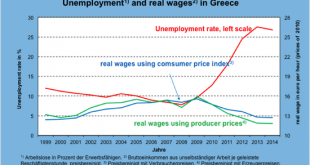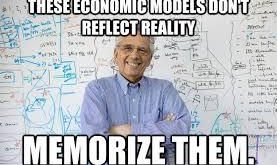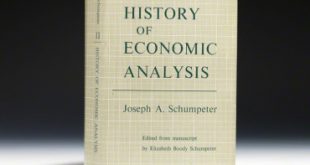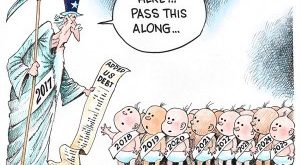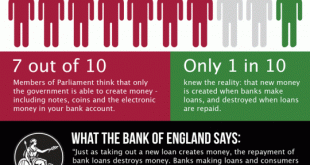Unemployment and real wages Not exactly the story that Mankiw et consortes tell you. But Heiner Flassbeck did.
Read More »Noah Smith’s new MMT critique — more nonsense on stilts
Noah Smith’s new MMT critique — more nonsense on stilts In recent years … macroeconomists have redoubled their efforts to match theory to data … This kind of research is not dramatic, headline-grabbing stuff. It doesn’t give instant answers to the big questions of macroeconomics … What it is, is science … Empirical macro represents a real, honest, ongoing attempt by dedicated researchers to explore the ins and outs of a hideously complex and hard-to-measure...
Read More »Debating MMT with Randall Wray
Debating MMT with Randall Wray [embedded content]
Read More »Vickrey on deficits and obfuscatory financial rectitude
Vickrey on deficits and obfuscatory financial rectitude We are not going to get out of the economic doldrums as long as we continue to be obsessed with the unreasoned ideological goal of reducing the so-called deficit. The ‘deficit’ is not an economic sin but an economic necessity […] The administration is trying to bring the Titanic into harbor with a canoe paddle, while Congress is arguing over whether to use an oar or a paddle, and the Perot’s and budget...
Read More »Mainstream economics — the true picture
Mainstream economics — the true picture Mainstream economists’ picture of economics looks like this: In reality, I would argue, it looks more like this:
Read More »Schumpeter — an early champion of MMT
Schumpeter — an early champion of MMT Evidently this phenomenon is peculiar to money and has no analogue in the world of commodities. No claim to sheep increases the number of sheep. But a deposit, though legally only a claim to legal-tender money, serves within very wide limits the same purposes that this money itself would serve. Banks do not, of course, ‘create’ legal- tender money and still less do they ‘create’ machines. They do, however, something—it...
Read More »Is public debt — really — a burden on future generations?
Is public debt — really — a burden on future generations? The real issue … is not whether it is possible to shift a burden (either in the present or in the future) from some people to other people, but whether it is possible by internal borrowing to shift a real burden from the present generation, in the sense of the present economy as a whole, onto a future generation, in the sense of the future economy as a whole … The latter is impossible because a...
Read More »Time to rewrite textbooks on money creation
Time to rewrite textbooks on money creation This article has discussed how money is created in the modern economy. Most of the money in circulation is created, not by the printing presses of the Bank of England, but by the commercial banks themselves: banks create money whenever they lend to someone in the economy or buy an asset from consumers. And in contrast to descriptions found in some textbooks, the Bank of England does not directly control the...
Read More »Tax avoidance — the elephant in the room
Tax avoidance — the elephant in the room [embedded content]
Read More »Negative interest rates — a Kaleckian perspective
Negative interest rates — a Kaleckian perspective At any one time a range of profit rates exists in the economy. That range may become more or less extensive in a boom or a recession, or move up and down with some profits cycle. However, the market forces equalising rates of profit across the economy … are weak. So that particular ‘long run’ has never been attained. The practical reality is that a range of profit rates always exists. That practical reality...
Read More » Heterodox
Heterodox

